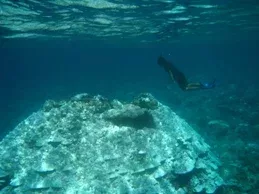 For the first time since 1998, mass coral bleaching is affecting coral reefs across a wide area of Southeast Asia and the Indian Ocean. Bleaching has been reported in Indonesia, Malaysia, Thailand, the Philippines, Maldives, and parts of east Africa. Coral bleaching is caused by increasing sea temperatures associated with global warming.
For the first time since 1998, mass coral bleaching is affecting coral reefs across a wide area of Southeast Asia and the Indian Ocean. Bleaching has been reported in Indonesia, Malaysia, Thailand, the Philippines, Maldives, and parts of east Africa. Coral bleaching is caused by increasing sea temperatures associated with global warming.
Dr Mark Eakin, coordinator of the National Oceanic and Atmospheric Administration’s (NOAA) Coral Reef Watch Program has stated in the Telegraph, July 2003, 2010 that “The bleaching is very strong throughout Southeast Asia and the central Indian Ocean. The reports are that it is the worst since 1997/1998. This is a really huge event and we are going to see a lot of corals dying.” An estimated 16% of the world’s reefs were killed during this event in 1997/1998.
In Indonesia, mass bleaching has been recorded in Aceh and Padang in Sumatra, in the Thousand Island National Park in Java, Karimunjawa National Park in Java, at Situbondo and Banyuwangi in Bali, The Gili indah Islands (Gili Air, Meno, and Trawangan) and Bangko-Bangko in Lombok, Kupang in West Timor, Wakatobi, Spermonde and Tomini Bay in Sulawesi, Ambon in Maluku, and Komodo. About 50 different organizations and individuals, ranging from surfers, fisherman, divers, dive operators and scientists have reported the bleaching from mid March to mid July 2010. Up to 100% bleaching of susceptible coral species have been reported, and in some areas, severe bleaching has also affected more resistant coral species. From the report, in general, bleaching reported in Sumatra and Sulawesi was severe (more than 75% bleaching), while reports of coral bleaching in Java, Bali, Lombok, Maluku and Raja Ampat, West Papua ranged from mild to medium severity.
The temperature is already going down in many areas in Indonesia. However, many expert fear that recovery can be a struggle. Resilience survey in Gili Indah by Reef Check Foundation Indonesia (RCFI) showed that some corals that were found bleached a month ago is already dead and covered by algae, and some has been affected by disease. A more concerning is recent report from the joint expedition by the Wildlife Conservation Society, James Cook University, and Syiah Kuala University in Sabang, Aceh where the preliminary result of this expedition has found that most of the bleached corals reported in found in May and June, are dead, only one month after. Acropora are the most affected species where up to 80% have died. Some more resistant species are still bleached, with most of them are expected die within next few weeks.This is one possibly of the most rapid and widespread events of coral mortality that has been recorded in Indonesia.
Coral reef practioners are working with governments and communities to assess the situation in Indonesia and monitor the impacts that this may have on the livelihoods of coastal communities. Naneng Setiasih (Reef Check Foundation Indonesia (RCFI) Chairwoman), Dr Joanne Wilson (Deputy Director of Science from The Nature Conservancy’s Indonesia Marine Program (TNC-IMP)) and Dr Stuart Campbell (World Conservation Society (WCS) Indonesia’s Marine Director) further stated that there is an urgent need for reef managers to urgently reduce all existing threats to coral reefs to ensure they have the best change of recovering from bleaching events. Coral reefs in Indonesia are already under threat from destructive and overfishing, anchoring, coral mining, pollution and sedimentation and reclamation of reefs associated with coastal development. Reefs affected by these stresses have less chance of recovering from coral bleaching. RCFI, TNC-IMP and WCS are working together to identify areas that may be more resilient to bleaching. Including these resilient areas in marine protected areas is one of the most important strategies to address climate change.
They have also initiated a bleaching network in Indonesia to compile reports and studies about bleaching and reef resilience in the face of climate change since 2007.
“Many studies have shown that healthy reefs are better able to recover from the effects of climate change. The importance of reducing ‘everyday’ threats to coral reefs to ensure their survival in the face of climate change cannot be emphasised highly enough,” Dr Joanne Wilson further noted.
“The success of these efforts, in many cases will depend on integrating the local management efforts by local communities, NGOs, and governments.” Naneng Setiasih added, stressing the importance to work together.
Dr Stuart Campbell stated that “all of these efforts have to be supported by science to help the managers take the best decision for management of some of the most globally diverse and important coral reefs.”
For further info or information on bleaching event in Indonesia, please contact:
- Jensi Sartin, program manager, Reef Check Foundation Indonesia: [email protected]
- Tri Soekirman, Deputy Director – Communications, The Nature Conservancy’s Indonesia Marine Program: [email protected]
- Dr. Stuart Campbell, Marine Director, WCS Indonesia: [email protected]